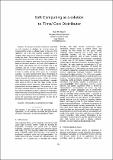| dc.contributor.author | Nabil M. Hewahi | |
| dc.coverage.spatial | Brest | ru_RU |
| dc.date.accessioned | 2023-11-27T09:17:06Z | |
| dc.date.available | 2023-11-27T09:17:06Z | |
| dc.date.issued | 2006 | |
| dc.identifier.citation | Nabil M. Hewahi Soft Computing as a solution to Time/ Cost Distributor / Nabil M. Hewahi // International Conference on Neural Networks and Artificial Intelligence : proceedings, Brest, 31 May – 2 June, 2006 / Edited: V. Golovko [et al.]. – Brest : BSTU, 2006. – P. 114–118 : il. – Bibliogr.: p. 118 (19 titles). | ru_RU |
| dc.identifier.uri | https://rep.bstu.by/handle/data/37212 | |
| dc.description | Набиль М. Хьюахи Программные вычисления как решение для распределения времени и затрат | ru_RU |
| dc.description.abstract | In this paper we present a theoretical model based on soft computing to distribute the time/cost among the industry/machine sensors or effectors based on the type of the application. One of the most unstudied significant work is to recognize which sensor in an industry for example has higher priority than others. This is important to know which sensor to be checked first and within time limits of the system response. The problem of such systems is their variant environmental situations. Based on these varied situations, the priority of the importance of each sensor might change from time to another. Due to this uncertainty and lack of some information, soft computing is considered to be one of the plausible solutions. The presented idea is based on initially training of the system and continuously exploiting the system experience of the degree of importance of the sensors. The proposed system has three main stages, the first stage is concerned with training the system to obtain the necessary system time to respond, the necessary time allocated to recognize which sensors to check (or which has higher priority), and the initial importance value for each sensor, which indicates the initial judgment about the sensor importance. The second stage is to use the system experience about the importance of the sensor using fuzzy logic to decide the final values of each sensor's importance Based on the output of the second stage and the output of the first stage, the system distributes the time/cost among the sensors (some sensors with lower priority might be neglected). The main idea of the proposed work is based on neurofuzzy. | ru_RU |
| dc.language.iso | en | ru_RU |
| dc.publisher | BrSTU | ru_RU |
| dc.subject | soft computing | ru_RU |
| dc.subject | мягкие вычисления | ru_RU |
| dc.subject | neural networks | ru_RU |
| dc.subject | нейронные сети | ru_RU |
| dc.subject | fuzzy logic | ru_RU |
| dc.subject | нечеткая логика | ru_RU |
| dc.title | Soft Computing as a solution to Time/ Cost Distributor | ru_RU |
| dc.title.alternative | Программные вычисления как решение для распределения времени и затрат | ru_RU |
| dc.type | Научный доклад (Working Paper) | ru_RU |
